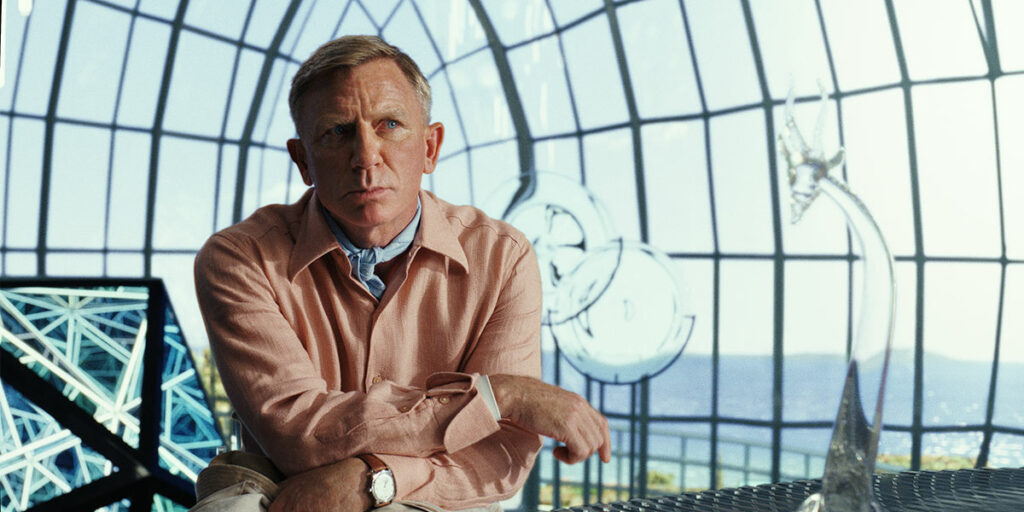Glass Onion ups the twists and scale from Rian Johnson’s Knives Out, while delivering fresh, subversive layers that maintain what made it great to begin with.
Out of all the films that were lined up for the Toronto International Film Festival, Glass Onion: A Knives Out Mystery is easily the one I was anticipating the most. It’s the (standalone) sequel to the whodunit Knives Out, one of my favorite films of the 2010s, from one of my favorite filmmakers working today in Rian Johnson. Not to mention he also made the best Star Wars movie since The Empire Strikes Back. I make no apologies for that statement. Glass Onion sees the return of Benoit Blanc (Daniel Craig) from Knives Out, who this time finds himself inexplicably invited on a trip to Greece, staying at the home of tech billionaire Miles Bron (Edward Norton). Joining him are Miles’s many friends, played by Kathryn Haan, Kate Hudson, Dave Bautista, and Leslie Odom Jr., among others. He also mysteriously invites his former business partner Andi (Janelle Monáe), who had a bitter falling-out with him. What initially seems to be all fun and games turns deadly when a murder occurs, and Blanc of course has to step in, investigate these larger-than-life people, and dare I say, peel back the layers of their pasts and motivations.
Knives Out pulled off the amazing feat of delivering a whodunit that had the very nature of the mystery be a mystery itself, while tying that mystery directly into a strong, socially relevant, character-driven journey. To do that once is impressive enough, but Glass Onion sees Rian Johnson somehow succeed a second time, in a way that’s both very similar and very different at once. The scale is definitely much larger, with most of the story taking place inside a large, beautiful mansion on a sunny Greek island. The quantity, range, and consequences of the mysteries have all been increased as well, but rather than fall into the classic sequel trap of thinking that bigger means better, Glass Onion uses that size to throw you off your guard even more and works it into the big payoff. The convoluted, disorienting nature of this story is completely intentional and used in more ways than one to throw you and the characters off. The notion of a story’s focus getting lost to its size and spectacle runs parallel to what several characters need to learn to overcome, in ways that are only apparent when you have the answers and are looking back at everything.
Glass Onion also continues its predecessor’s means of having the mystery be about more than just who killed someone and why. These movies are proving that they want to use their mysteries to say something about the state of our own social and political climates. There are blatant examples on the surface that no one could miss, but digging deeper into the core of the mechanics of the mystery, including why and especially how everyone operates the way they do, exposes a microcosm of much grander issues in our own society. In this case, to be as vague as possible, that microcosm revolves around blatant systemic corruption that’s kept intact by the noise and distraction of other voices getting in the way. Glass Onion is also much more aggressive than Knives Out in expressing what it wants to say, especially in its bombastic climactic sequence, which is one of the most satisfyingly therapeutic final stretches I’ve seen in a while. It feels like Rian Johnson essentially screaming out in rage at the state of the world, and it’s another example of how the mystery itself isn’t as big a draw to these movies as how everyone reacts and weaponizes these mysteries.

Benoit Blanc is the only returning character from the previous film, and, though he had a fair number of laughs in his first appearance, he’s gotten more consistently funny now, both due to the writing and Daniel Craig’s charming, eccentric delivery that feels second-nature for him now. He also comes across as less bumbling, seeming savvier to the shadiness around him while still giving us plenty of moments to laugh athim. Even his one established Achilles’ heel that seems like a joke works its way into his progression as a character in the endgame. But he’s once again just one piece of the puzzle in a larger ensemble cast… and this is where Glass Onion feels the most inferior to Knives Out, as I didn’t find most of these characters as interesting or memorable as their predecessors. There’s a handful of standouts and scene-stealers, but they’re not as numerous. Everyone does great with the material they’re given, but only a select few are given remarkable material. I’d like to go into more detail as to who specifically stands out and who doesn’t, but I feel like doing so would narrow down the field of who to watch out for and who not to watch out for when trying to put the pieces together.
Because a lot of characters are generally forgettable, Glass Onion starts off a little slow. After a hilarious opening sequence, the story takes a little while to really get interesting or hook you. But once everything picks up, it keeps building and building at an energized, infectious pace. It does this despite a massive turn in the storytelling that completely shifts the focus to fill in gaps. This could have grounded the momentum to a halt, but it builds on what we already know while piling on new massive wrinkles. It also helps that this turn introduces the main emotional crux of the story. It’s pretty risky to set up such a pivotal plotline so late into the film, but it pays off for how it adds to an already-perplexing dilemma. Glass Onion as a whole is also funnier than Knives Out, whose humor could be a bit hit-and-miss. Here, the jokes fit in more naturally, meshing well with the rising tension so that you’re both laughing and nervous at the same time.
Considering Glass Onion: A Knives Out Mystery is a follow-up to a very successful theatrical hit, I’m a bit perplexed as to why it’s being released exclusively on streaming. I’m even more perplexed after actually seeing the film and the many eccentric, stylish shots that Johnson’s long-time cinematographer Steve Yedlin gets. The camerawork is full of playful zooms and pans that keep the energy up. The mansion is a lavish, lovely-looking setting that makes for a lot of fun imagery, especially with how it makes use of the many glass decorations and structures inside and outside the not-so-humble abode. The colors strangely don’t pop the way I’d like them to, but the production design and the framing of objects and environments more than make up for that.
Between Glass Onion and Knives Out, I have more of a fondness for Knives Out. It has a more personal touch, a slightly more clever spin on the murder mystery genre, and a more well-rounded group of characters. But I wouldn’t dare call Glass Onion an unworthy sequel in any way. It still stands on its own as a great movie that continues what we love about the original without retreading or losing what made it so fresh. In addition to polishing up the humor, it finds new and inventive ways to keep audiences guessing and weaving substantial commentary into its own twisted version of a whodunit. The characters that do stand out really stand out, and they take center stage to a story that, once it finds its footing, escalates and dials up the intrigue and suspense to reach an explosive, immensely fulfilling conclusion. It’s a great experience while watching, and it only gets better the more you think back on how everything clicks into place. If Rian Johnson still wants to send Benoit Blanc on more twisty adventures after this, he’s proven that the Southern-accented detective will remain in good hands.
Glass Onion: A Knives Out Mystery is now available to stream globally on Netflix. Read our reviews of Knives Out and Wake Up Dead Man!

